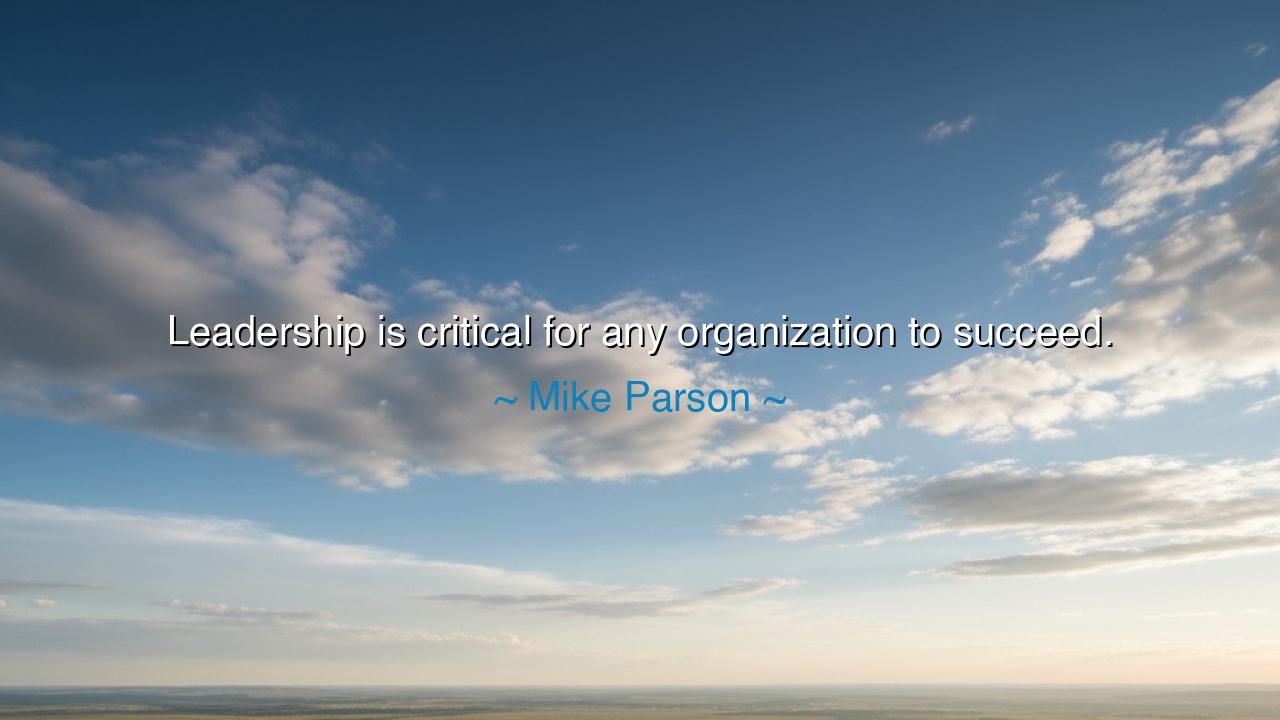
Leadership is critical for any organization to succeed.






Hear the words of Mike Parson, plain and direct, yet filled with timeless gravity: “Leadership is critical for any organization to succeed.” Though short, this truth carries the weight of centuries, for from the dawn of civilization until this very hour, the rise or fall of every people, every army, every guild, every nation has rested upon the shoulders of its leaders. Without leadership, the strongest walls crumble, the richest treasuries are squandered, and the brightest talents fall into discord. With true leadership, even the poorest band of souls may rise to greatness.
The ancients understood this well. Consider the Israelites in the wilderness. Though they had escaped the chains of Egypt, they wandered in confusion until Moses stood as their guide. Through storms, rebellion, and despair, his leadership held them together, pointing them always toward the Promised Land. Without him, they would have scattered into the desert winds. This is the heart of Parson’s wisdom: an organization without leadership is like a body without a head—it may move for a time, but without direction it will perish.
History gives us many such lessons. When Alexander the Great took command of his armies, he was but a youth. Yet his vision and charisma transformed common soldiers into conquerors who carried his banner from Greece to India. Alexander’s men did not march because they were the strongest or most numerous, but because their leader inspired them to believe they could accomplish the impossible. His story stands as a monument to the truth that leadership ignites the spirit, and spirit wins victories greater than numbers or arms.
But the opposite is also true. Recall the fall of Napoleon at Waterloo. His troops were skilled, his armies seasoned by countless victories, yet his judgment faltered, and his pride clouded his vision. The failure of leadership turned strength into weakness, and the empire he built in fire collapsed into dust. So we see that while leadership can raise men to glory, its absence or corruption can just as swiftly hurl them into ruin.
Parson’s words remind us, too, that leadership is not confined to kings or generals. It belongs also to the teacher in her classroom, the parent guiding a family, the worker who inspires his companions. Every organization—great or small—requires someone who carries vision, someone who sets example, someone who steadies the heart in moments of doubt. Leadership is not about command alone; it is about responsibility, courage, and sacrifice.
The lesson, my children, is this: seek leaders who embody virtue, and strive yourselves to lead when called. Do not wait for greatness to be thrust upon you. In small matters, practice integrity. In daily tasks, guide others by example. For leadership begins not in the throne room, but in the heart that dares to stand firm when others falter. And know this: the greatest leader is not the one who seeks glory, but the one who ensures the success of those he serves.
Practical steps follow. If you find yourself in a position of leadership, listen before you speak, and inspire before you command. If you are led, support your leaders with honesty, but do not fear to hold them accountable. In all things, remember that leadership is not about self but about the whole. When every person understands this sacred balance, organizations—be they nations, companies, or families—will not only succeed but endure.
Thus, let the words of Mike Parson be a guiding star: “Leadership is critical for any organization to succeed.” Guard this truth in your heart. Teach it to your children. Live it in your work. For as long as there are men and women walking the earth, the destiny of their labors shall rise or fall upon the strength, wisdom, and courage of their leaders.






AAdministratorAdministrator
Welcome, honored guests. Please leave a comment, we will respond soon